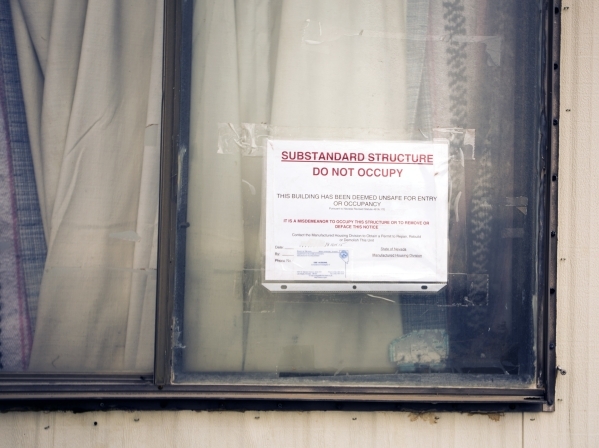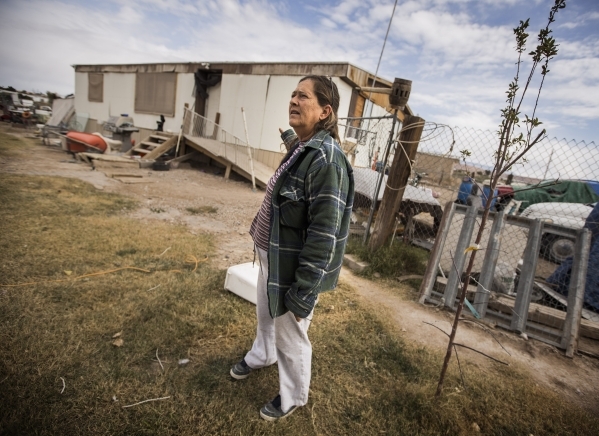Overton woman escapes Catch-22, returns to mobile home
OVERTON — After a bureaucratic nightmare left her virtually homeless for a year, unsure what her future would hold, Bonnie McGrew has a plan.
Instead of sleeping in a cramped motor home, she's once again living in her double-wide trailer on her property in the Moapa Valley, an hour north of Las Vegas.
She has the blessing of Clark County commissioners. Soon, she hopes to have permits in hand to put in a front porch and redo the kitchen, walls, windows, siding and roof. And she'll have the pink bathroom tile she's always wanted.
"It's going to be like a real home," McGrew said with a smile Friday, standing in her kitchen. "And I am just so excited."
A few months ago, she was caught in a Catch-22.
Only after she had moved a new trailer onto her property last year, with county permission, was she told she needed to pay for a drainage study because the land is on a flood plain. The cost: $12,500.
McGrew didn't have the money. She couldn't get a loan for it against her land, a bank told her, because she had an "unpermitted" mobile home on her property — the very mobile home the county had told her to go ahead and put there.
Without the drainage study, she couldn't live in the trailer and couldn't do any work on it. A county employee told her she could go to jail just for sleeping in it.
Commissioners help
If she'd known about the need for a study, McGrew would have just left her two old single-wide mobile homes where they were and made the best of it.
This summer, a county spokesman said McGrew hadn't been notified of the need for a drainage study earlier because of staffing cuts dating to the recession. Despite its own part in creating the predicament, county staff didn't budge.
But when he heard about the case a few months ago, then-Commissioner Tom Collins, who represented the Moapa Valley, intervened. Collins and his successor, Marilyn Kirkpatrick, along with staff liaison Janice Ridondo, worked with staff to figure out a solution.
Earlier this month, the seven commissioners voted unanimously to let McGrew move into the new mobile home without a drainage study.
Under a compromise, she'll have to pay for the study in two years. But by that time, she plans to be in the process of building a 2,000-square-foot house farther back on her property, meaning she can fold the $12,500 cost into the construction loan.
McGrew, 58, credited the two commissioners and Ridondo for their efforts. Collins said Ridondo did the nitty-gritty work. Kirkpatrick, who couldn't be reached Friday, said during a Nov. 4 public meeting that she was glad staff had been able to help solve a constituent's problem.
Collins said he's glad McGrew has a solution. But he said county staff handled the situation badly, letting bureaucracy and "bull----" trump doing the right thing.
"They led her to believe that she could just drag the old (trailers) off, drag the new one on, and everything's fine," Collins said.
'That stopped everything'
McGrew bought her land off a gravel road in Overton, a bit under 2½ acres, in 1990. Until last year, it had two single-wide trailers connected with a breezeway. McGrew lived in one and her son in the other.
When her son moved to Texas, she decided to replace the trailers with a double-wide that would have more room for her and her dogs. Meanwhile the county, after being sent out for an unrelated animal complaint, deemed the old structure unsafe because of debris.
So McGrew found someone giving away a double-wide trailer, and in May 2014 she submitted plans to the county to move it onto her land.
While waiting to remove the old trailers, she'd left the new one by the side of the road, but county staff ordered her to move it from the public roadway.
So she did. In June 2014, she bulldozed and pushed out the old trailers — which were in such bad shape they couldn't be towed — and put the new one in their place. She moved in and thought things were fine.
Then, in August 2014, McGrew got an email from the county telling her about the drainage study — and the $12,500 tab.
"That stopped everything," she recalled.
County law requires compliance with Federal Emergency Management Agency guidelines for homes in flood plains. Those include drainage studies to see how high off the ground homes need to be to withstand a 100-year flood.
Never mind, McGrew said, that water had never gotten into the existing trailers — which were the same height as the new one — during four major floods between 1985 and last year.
'I want it nice'
McGrew knows how to navigate county bureaucracy — or thought she did — since she works for a small home-building firm.
So when she decided on the new trailer last year, she jumped through every hoop she knew about.
"I did exactly what everyone told me," she said, "and then everything changed in midstream."
McGrew blames much of her problem on county departments not talking to each other.
She said she didn't think of asking for help from elected officials. She only happened to mention her problem to Ridondo, the county commission staffer, while talking to her about something else.
A few months ago, Collins told her she'd done everything right and she should move back into her trailer. So she did, she said, about a week after an early August article about her situation ran in the Review-Journal.
Last week, with the commission vote on her side, she applied for all the state and county permits she needs. She hopes to be able to begin renovations on the trailer in a couple of weeks. For now, most of the supplies are sitting in her yard or at her company's property.
Asked why she's putting so much work into a mobile home when she'll have a house in a couple of years, she said, "Because I want it nice while I live here."
Contact Eric Hartley at ehartley@reviewjournal.com or 702-550-9229. Find him on Twitter: @ethartley.



































